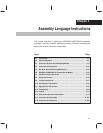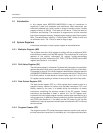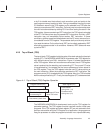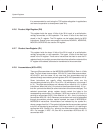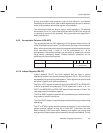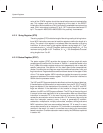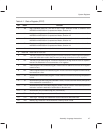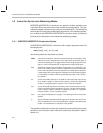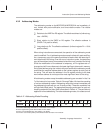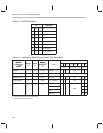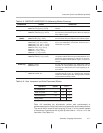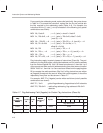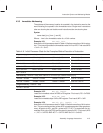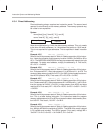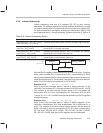
Instruction Syntax and Addressing Modes
4-8
4.3 Instruction Syntax and Addressing Modes
MSP50P614/MSP50C614 instructions can perform multiple operations per
instruction. Many instructions may have multiple source arguments. They can
premodify register values and can have only one destination. The addressing
mode is part of the source and destination arguments. In the following subsec-
tion, a detail of the MSP50P614/MSP50C614 instruction syntax is explained
followed by the subsection which describes addressing modes.
4.3.1 MSP50P614/MSP50C614 Instruction Syntax
All MSP50P614/MSP50C614 instructions with multiple arguments have the
following syntax:
name [
dest
] [,
src
] [,
src1
] [,
mod
]
where the symbols are described as follows:
name
name
of the instruction. Instruction names are shown in bold letters. If the
instruction
name
is followed by a B, the arguments are all byte types. If
name
is followed by an S, all arguments are word string (strings of words)
types. If
name
is followed by BS, all arguments are byte string types.
dest dest
ination of data to be stored after the execution of an instruction. Op-
tional or not used for some instructions. Destination is also used as both a
source and a destination for some instructions. If a destination is specified,
it must always be the first argument. Destinations can be system registers
or data memory locations referred by addressing modes. This is instruc-
tion specific.
src s
ou
rc
e of first data. Optional or not used for some instruction. Source can
be a system register, a data memory location referred by addressing
modes, or a program memory location. This is instruction specific.
src1 s
ou
rc
e of second data. Some instructions use a second data source. Op-
tional or not used for some instructions. Source 1 can be a system register,
a data memory location referred by addressing modes, or a program
memory location. This is instruction specific.
mod
pre or post modification of a register. The meaning of
mod
is instruction
specific.
[ ] Square brackets represent optional arguments. Some instructions have
many combinations of source and destination registers and addressing
modes. The combination is instruction class specific.
The possible combinations of sources, destinations and modifications are de-
pendent on the instruction class. Instruction classes are discussed in detail in
section 4.4.




